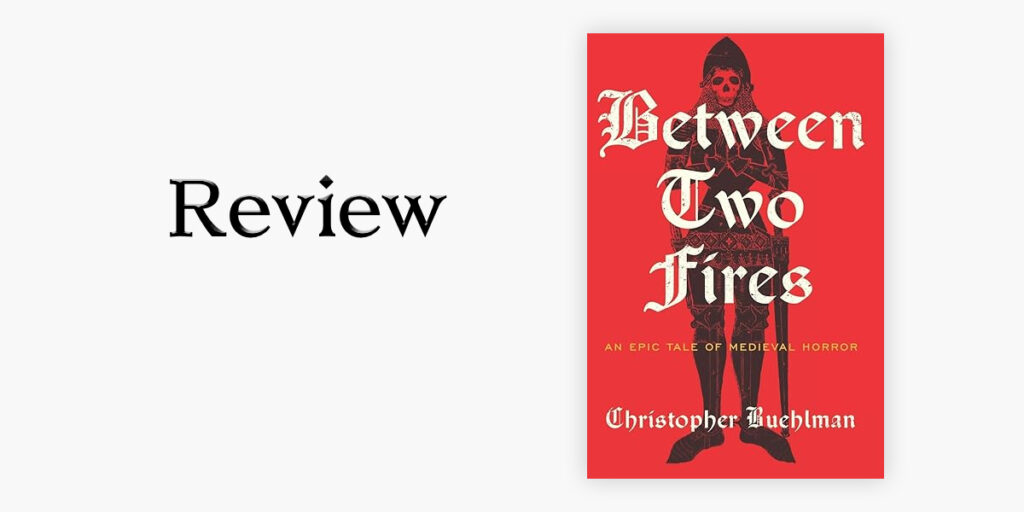Warning: spoilers ahead.
Yes, I figured it was high-time I wrote something that will no doubt rub people up the wrong way. Not because I’m a contrarian, but because I’m forever having this debate in private, so I figured it was high-time that I nailed my colours to the mast in a public forum.
So, without further ado—and with another warning that there will be spoilers ahead—here, in ascending order of preference, is how I rate the seven books in Stephen King’s epic Dark Tower series.
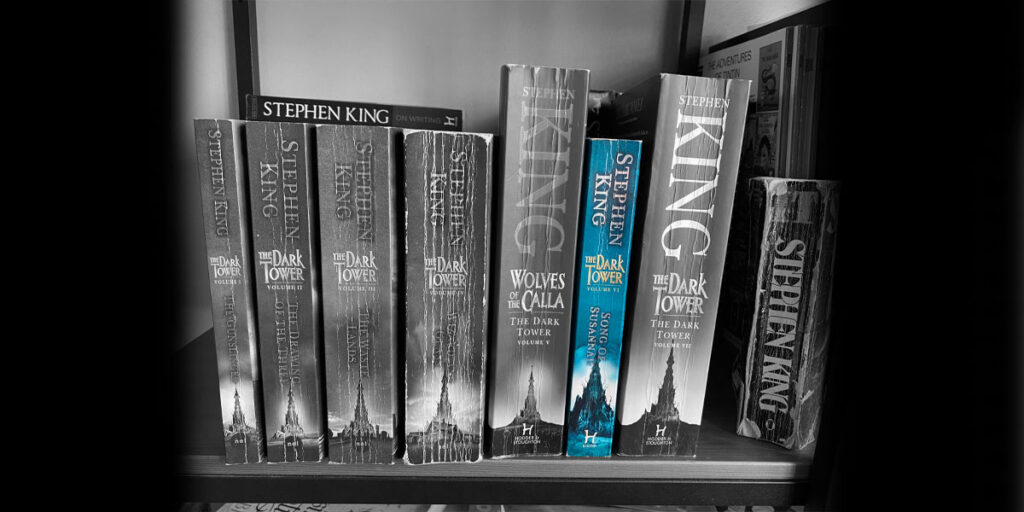
7th – Song of Susannah (book 6 in the series)
Oof, where to start? I think if ever there was an example of a novel that tries to do too much, all at once, then it’s this. Even in a series as ambitious as The Dark Tower, this feels like more than a few steps too far. The book is chunky and ponderous, and although the plot trudges onwards and a bunch of important stuff happens, it actually feels like one of the least important entries to the entire saga.
Not only that, but King self-inserts himself as a character and gets really meta with the writing of the series itself (dark forces are working against the Stephen King in the story to stop him completing a body of writing about the eponymous tower…it’s all a bit much). Don’t get me wrong, King has more than enough credit in the bank to try something this mad, but—for me at least—it doesn’t work.
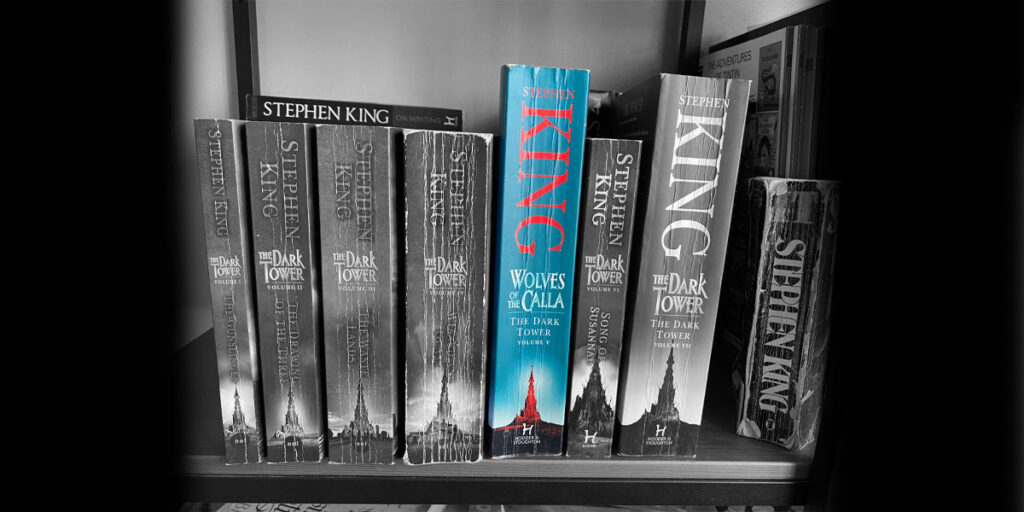
6th – Wolves of the Calla (book 5 in the series)
Directly preceding Song of Susannah is this book, and it almost feels like the unravelling in book 6 begins here, too. The story becomes fragmented and the writing becomes self-referential and a little bit of a drudge.
It’s partly redeemed by the traitorous Andy the robot, as well as the tension built by the upcoming deadline for the Wolves of the Thunderclap to launch their preordained kidnapping raid on the people of the Calla, but it also feels far too long for what it is. Revelations regarding Susannah’s pregnancy and the beginning of the plot-line to protect the rose in New York fall a bit flat, and overall the story starts getting a bit too fragmented to be as enjoyable as the rest of the series.
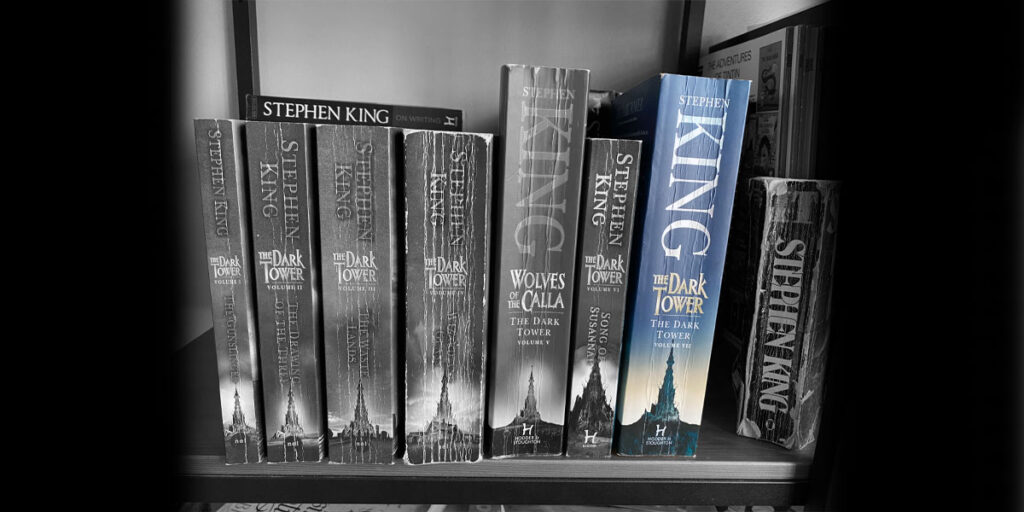
5th – The Dark Tower (book 7 in the series)
Yes, really – the conclusion to the seven-book epic saga only ranks 5th in terms of my ratings. This book is much less convoluted than both Song and Wolves, but some of the meta-style thinking still remains, with Stephen King (the character) being saved from the van that actually ran him over and nearly killed him (in real life). I can understand how King drew so much from what must’ve been a horrific experience, and I both commend and applaud him for trying to translate it into his art (he has cited the real-life incident as one of the reasons he returned to finish The Dark Tower series) but, as a story, I just didn’t vibe with it.
That being said, this book is definitely stronger than its two direct precursors. The writing is much tighter, and the stakes feel higher. The danger more pronounced. This is, of course, massively helped by the deaths and departures of pretty much the entire cast of main characters, which then ratchets up the emotional turmoil placed on our main man, Roland. Ranking it fifth best in the series makes me feel a bit uncomfortable, because it’s still a damn good book.
And finally, of course, we have the ending. The ending that had real-life death-row inmates purportedly writing to Stephen King, asking him to reveal it to them before the book was published, promising to take the secret to their graves. Everything leads to this, and if you’re reading the series for the first time you will be desperate to get there.
Lots of people were disappointed by the ending. I was not one of them.
I thought it was perfect.
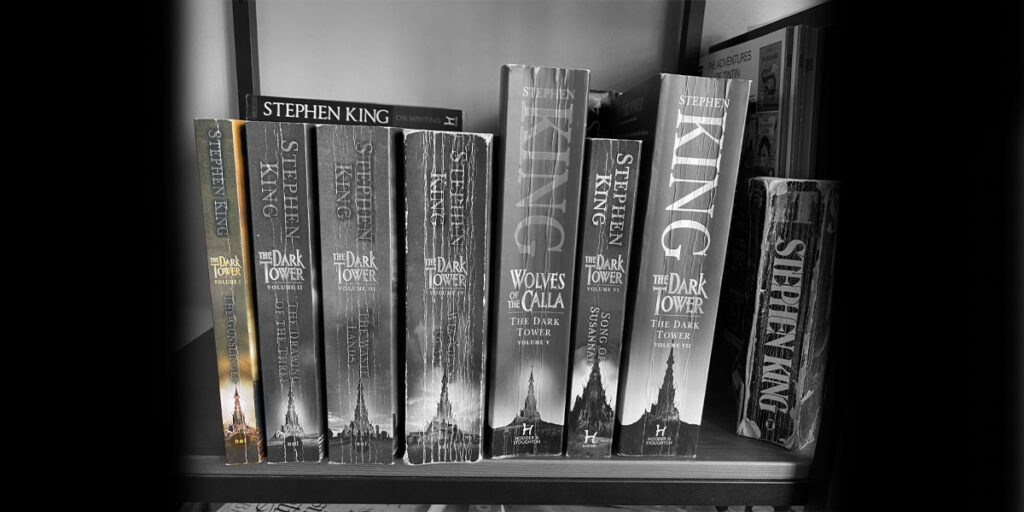
4th – The Gunslinger (book 1 in the series)
Whiplash now as we race right back—somewhat ironically (IYKYK)—to the beginning of the series.
The starting point of our adventure is, by far, the shortest entry in the series, but actually I think it carries more impact than some of its chunkier siblings. We’re introduced to Roland, a single-minded and ruthless gunslinger, and a devastatingly bleak desert setting inside a scarred dust bowl. There is plenty of action, with the gunfight in Tull and the escape from the Slow Mutants, and there is a real sense of dread created around the focus of Roland’s mission, the man in black.
We also see, for the first time, just how obsessed Roland is with his quest. In turn, I think that planted the seed of obsession in me, as a reader, to go on this journey, too.
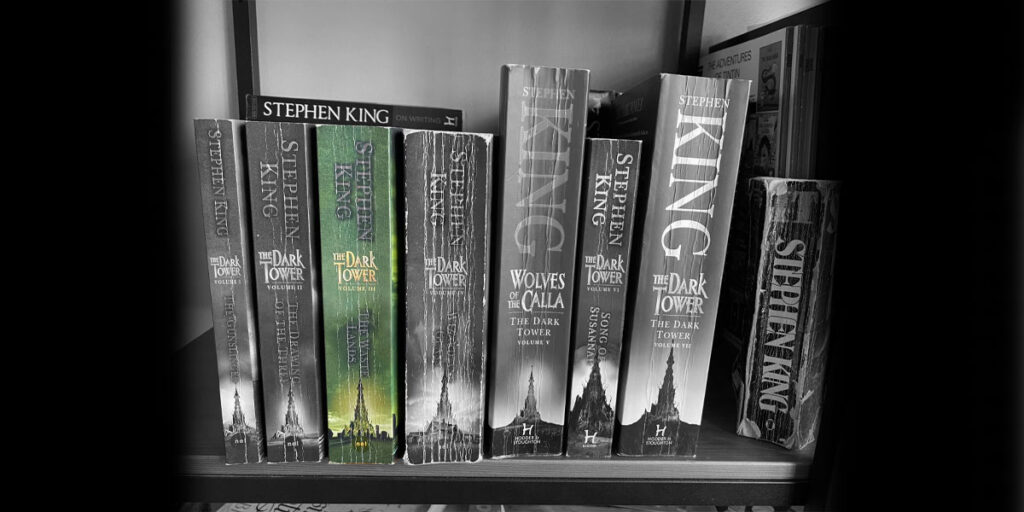
3rd – The Waste Lands (book 3 in the series)
In third place is book number three in the series. The first half of the book reintroduces us to the character of Jake Chambers, whom Roland has paradoxically saved/killed and therefore split both of their minds apart. The storyline is superbly executed and resolved in a very satisfying way, reuniting the ka-tet and saving both Roland and Jake’s minds in the process.
We also meet Oy for the first time, and that is worthy of a bump up the rankings in its own right.
The second half of the book is an example of great post-apocalyptic writing. The war-ravaged city of Lud is a desolate landscape, and characters from both factions fighting over its corpse are brilliantly written. The Tick-Tock Man is a great example of King’s ability to craft what I often refer to as “minor villains” without blunting any of the actual threat that they pose.
And the book’s finale is a humdinger, too. A psychotic AI-powered monorail (Blaine) proves to be their escape route from the city’s explosive destruction, but also promises to derail at the end of the line—killing both itself and its small contingent of passengers—unless it can be bested in a riddle contest. It’s Stephen King at his audacious best.
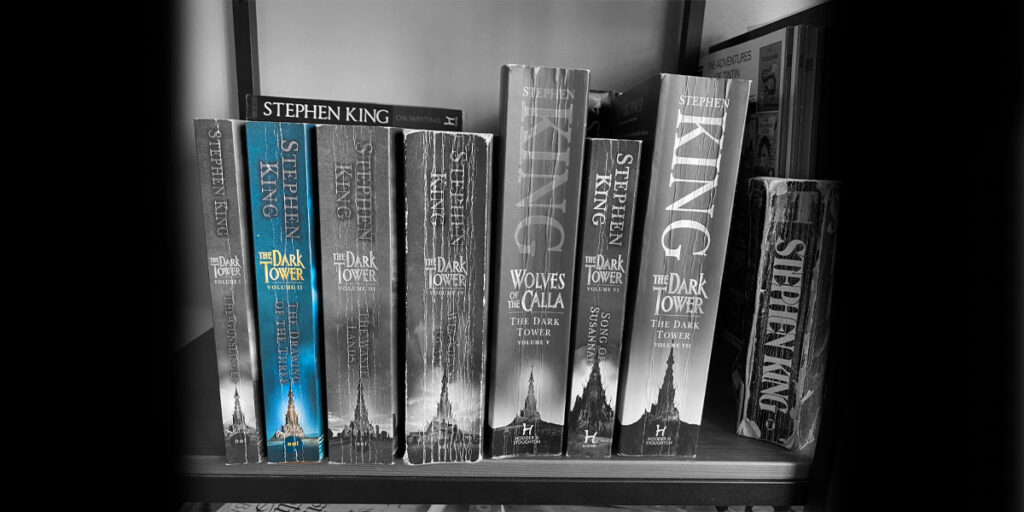
2nd – The Drawing of the Three (book 2 in the series)
This is usually the bone of contention I have when talking about these rankings in private. A lot of people put this book as their favourite in the series and, honestly, I can’t fault them. But I’ll explain why it’s only second in my list in the next section. First, let’s talk about how good The Drawing of the Three is!
This book is a bonafide masterpiece. We’re reacquainted with our main character, Roland, but he is immediately beset by a terrifying (and wonderfully memorable) group of sea-dwelling creatures that he dubs lobstrosities. Creatures that patrol the beaches and severely injure our protagonist in the process. What follows is incredibly-paced storytelling across different times, places and spaces (through the medium of several freestanding doors) bringing two more main characters (both brilliantly written) into play, as well as giving Roland an opportunity at a minor flash of redemption (albeit one that creates additional problems in the next instalment, as well as solving others in this one). Phew.
For lots of people, this is the peak of The Dark Tower series, and although I find it hard to disagree with them, there can only be one at the top of the tower pile…
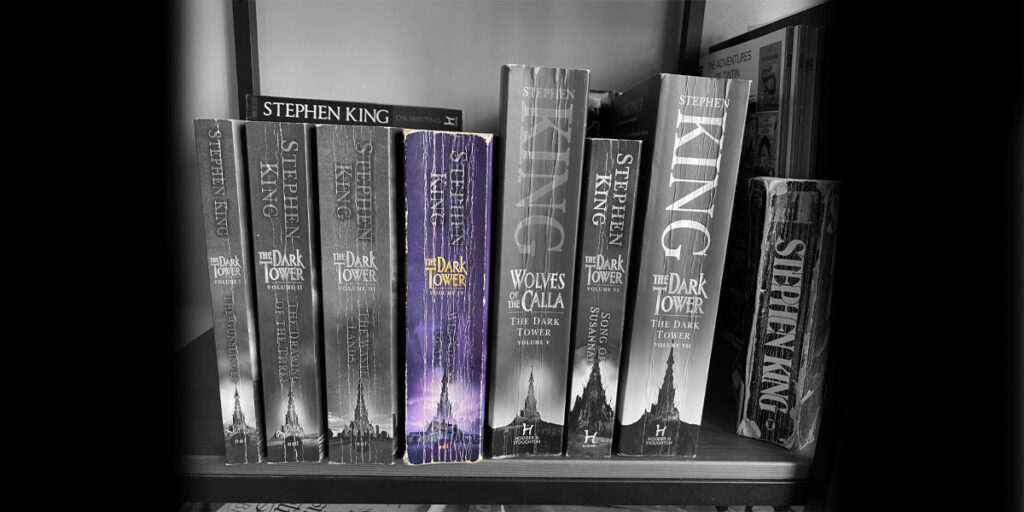
1st – Wizard & Glass (book 4 in the series)
Stylistically, this book feels like a return to what you get from The Gunslinger, it’s a western-style story-within-a-story, as Roland gathers his ka-tet around him to tell them of his adolescence and the beginning of his obsession with The Dark Tower.
In his story, we see a younger Roland—accompanied by two of his close friends—as they face down countless challenges in a back-water barony, using their fledgling gunfighting skills, trickery and nous to overcome the richly-written cast of adversaries who cross their paths. There are bounty hunters, wild-west witches and the ominous presence of a thinny.
But what is really impressive about this book is how well it shows the depths of Roland’s motivations. The story of his early life is as heart-wrenching and emotionally devastating as it is action-packed and rip-roaring. We can feel the turmoil as he expects his newfound companions to abandon him, horrified by his past actions and the calamities he wrought on those closest to him. And I almost cheered aloud when the characters instead declare their commitment to Roland, and to the quest of reaching The Dark Tower.
It is, for me, King’s finest in the series.
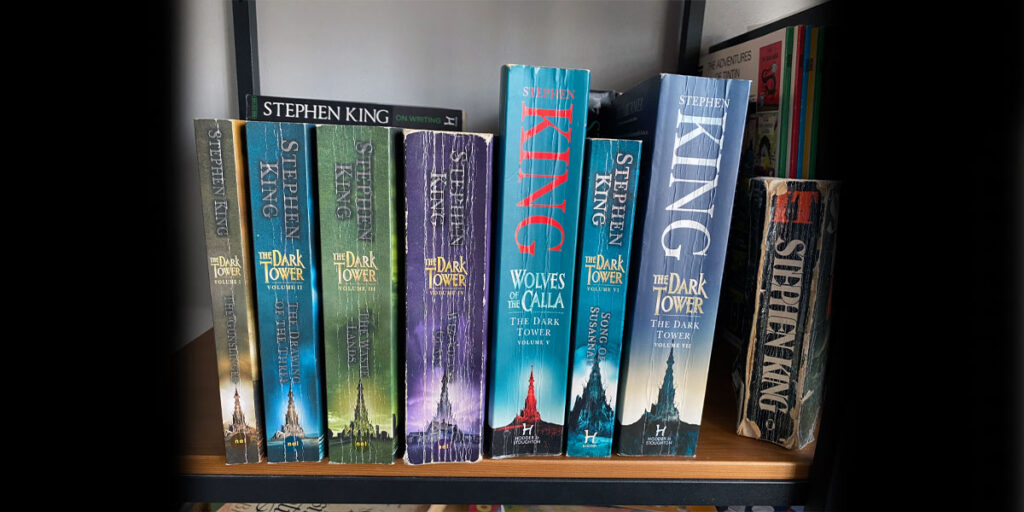
Final thoughts
Ranking these books always feels a bit disingenuous, as it’s a beloved series for a reason. As you can see from my plotting below, the seven-book saga starts very strongly, but begins to waver as it approaches the home-straight.
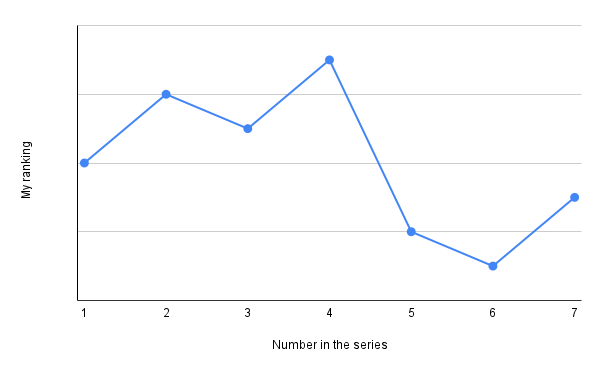
It’s also an epic undertaking. Easily over a million words long (somewhere in the region of 4000 pages, if that’s your preferred metric) – reading them is a big commitment. As a result, I can fully understand those readers who would only visit the saga once in their lifetime. But what I will say is that—in this reader’s humble opinion—that lifetime will be richer for the experience.
📚✌🏻SP
Share this post
Steve Pannett is an author and designer based in Yorkshire, UK.
He writes primarily in the fantasy genre, combining character-led storytelling with epic, gritty world-building to create dark tales with plenty of action and lots of twists along the way.
He has self-published multiple books and is active online.

